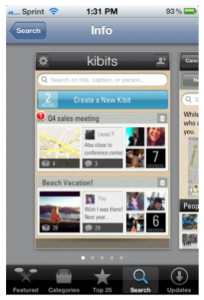Most corporate discussions about knowledge management (KM) are about databases, software, and IT. One mid-sized law firm I know took a different approach – getting partners to interact over lunch. It was very effective.
It turns out the 1-to-1 nature of speed dating is perfect for mega-companies that want to improve KM.
That’s the kind of insight Clay Hebert has come up with. I met with him recently in his coffee-shop office so far on the West Side of Manhattan it might as well be in the Hudson. Here are excerpts.
Charlie: We’ll get to the speed-dating thing soon; but first, how’d you get to this point?
Clay: The quick story? I spent ten years at Accenture, a massive consulting company. Even though I was surrounded by smart, hard-working people, the work wasn’t stimulating. I was a “Mac” soul stuck in a “PC” company.
In January of 2009, I had my big break. My business hero Seth Godin offered a unique and exclusive MBA program, and I was accepted. There were more than 500 applicants and I was one of nine who were chosen. For six months, nine of us sat around a table in Seth’s office learning from the marketing master (and each other). It completely changed my life. After that, there’s no way I could go back to corporate America.
Now, I’m building a technology startup called Spindows.com – an enterprise video chat platform that will change the way organizations collaborate and share knowledge.
Sharing Knowledge
Charlie: I hear collaboration, I hear video-chat; I can infer speed-dating, I think. But tell me more.
Clay: After a decade at Accenture, I only knew about 100 colleagues, 1/20th of 1% of the company. This is astonishingly inefficient when you think about the skills and expertise that should be shared across the organization.
The single most valuable asset for most companies is the knowledge of its employees. Most companies understand this, but their current KM solutions consist of clunky file-shares and databases.
It’s a tremendous opportunity wasted.
Charlie: You’re right, it is an astonishing waste; every big company I know reverts to massive databases then worries about incentives to get people to load the data, or hires support staff to do it. Lately, they’re all trying various social media. But it’s still kind of artificial, or time-consuming, or just not interesting.
So, what’s the answer?
Clay: Well, I’m hoping Spindows will be at least part of the answer.
There are three main problems with the current KM process:
- You need high quality information
- You need that information input into a system in a timely manner
- Other employees need to be able to find it.
In short, the KM process is broken due to quality, speed, and search. Here’s an example of each:
- Quality – Here’s a common KM scenario: the lowest level analyst or intern gets assigned the task of uploading project summary documents to a database or file-share. There is limited correlation between these often-insipid documents and the true learnings from the project. The KM process itself is treated like an administrative burden instead of a golden opportunity.
- Speed – This process often happens at the end of a long project. If anyone does find the information, it’s outdated at best. In our fast-paced world, knowledge transfer should happen in real-time, or close to it.
- Search – The search algorithms to find the knowledge are woefully inadequate. I recently heard that one big consulting firm actually outsourced these searches of their own KM systems to an outside vendor. Think about that for a second. The search algorithms are so bad that they pay a third party to help find their own internal information. Now that’s broken.
Spindows cures these three problems, through a video speed-networking platform where you rapidly meet relevant people in your own organization via a series of quick 1-on-1 video chats.
First, everyone fills out a user profile with simple attributes (tags) that describe their knowledge and skills as well as things like their title, industry and personal interests.
A Spindow is a completely new kind of meeting. Instead of inviting people, you invite these tags or attributes. Anyone matching these tags is invited to attend the session.
In the Spindow itself, the 1-to-1 video interactions are rapid and timed, say 4 minutes each, so at the end of a one-hour Spindow, you’ve met 15 relevant colleagues. By attending just one Spindow per week, over the course of a year, you can meet everyone in a 780 person division.
Spindows reduces friction and increases serendipity by being the easiest way to find and connect with relevant colleagues.
Charlie: Wow, very cool indeed! Where do you stand in terms of status? Have you gotten written up? Funded? Testing?
Clay: Spindows has received some great press from Business Insider, and excellent feedback from events like Startup Riot, Startup Camp, and Under 30 CEO’s startup pitch event, where we scored second place.
We’re thrilled. Right now we’re working with a minimum-viable product (MVP). It’s functional, and we’ve done some testing.
Going forward, we plan to invite a select group of early enterprise customers to try the product at discounted pricing. This is win-win because the early adopters will be allowed to take advantage of this great new technology before it’s available to the public. And it’s great for us because that early customer feedback will allow us to shape the product direction and roadmap.
Trust Works
Charlie: Let’s talk about why this makes so much sense. In my view, it’s allows super-high bandwidth – human interaction – in a socially acceptable casual wrapper. You can be ‘promiscuous’ with your interactions, and still get far deeper than if you just relied on databases and social media. You’re talking to real people. This has tons to do with trust.
Clay: Exactly. You’ve nailed it. I believe people will be more open and trustworthy when talking directly to their colleagues. We’re combining high bandwidth human interaction with big data and analytics. Companies will be able to track how many Spindows someone has participated in, who they have met and, who they still need to meet.
We’re working with PhD’s at Wharton to design valid tests to track how quickly the expertise tags are spreading throughout the organization, effectively proving that trust leads to better KM.
Charlie: Speaking of trust: you’re a heavy user of Airbnb, a Sharing Economy business whereby you rent out your apartment to others, and vice versa. Do you worry about people trashing your apartment? How do you prevent that?
Clay: It’s all about trust. Before they arrive, we establish a personal bond with the people who use our place. Before they come, we ask them what DVD’s they’d like us to get for them on Netflix. We leave a bottle of wine and neon Post-It notes all around the apartment encouraging them to drink the wine, read our books, surf the internet, etc.
We write notes to people on our white board and they always leave us notes when they leave, usually describing what they did on their trip. Airbnb is extremely safe in general, but these extra steps make the interaction inescapably, richly human.
Charlie: This is great social proof of “the best way to make someone trustworthy is to trust them.” Trustworthiness and trusting-ness are intertwined –
Clay: – You get what you give –
Charlie: – and each is both cause and effect.
Clay: – and you want to give what you get.
Charlie: Clay, no wonder you’re a leader in some of the new social media arenas. Next time we’ll talk about your experiences in some of the New York incubator labs for new technologies.
Clay: Can’t wait!




 Our Story Time series brings you real, personal examples from business life that shed light on specific ways to lead with trust. Our last story proved that
Our Story Time series brings you real, personal examples from business life that shed light on specific ways to lead with trust. Our last story proved that